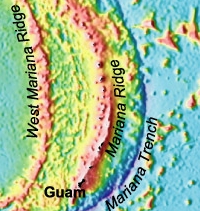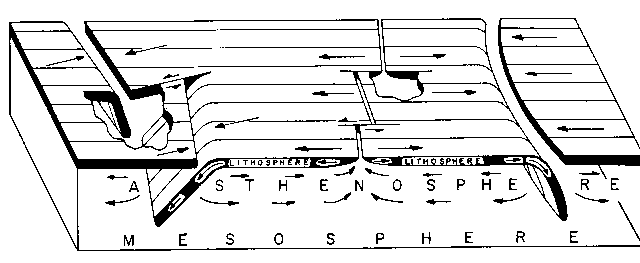I just finished reading an article by an MS seeking geologist (Nancy Price) in The Professional Geologist (American Institute of Professional Geologists) with the title of today's blog. The piece was very well-written and described some of the issues facing students/faculty in the Geological sciences. These problems may be faced to some degree by other programs. It was interesting to hear the students perspective and although she was right on with many of her comments, she did miss one big picture item.
Here's the gist of what is going on with geology today. At many universities, geology is being eliminated as a major or combined with other departments so as to make the major nearly invisible. I can think of three recent cases. The first is
Indiana State University (my first professorial job). When I arrived, the Department was called "Geography, Geology and Anthropology". That's an already watered-down version of Geology, but ISU is a smallish campus (11,000) with a mainly commuter student body. Still, the departmental faculty were all vibrant hard workers and we served a lot of students well. I was tenured at ISU in 2000, but saw the handwriting on the wall. I was lucky in that a tenure-track position opened up at the
University of Florida and I was hired (back at the Assistant Prof level and had to go through the tenure process again). Two other colleagues 'escaped' and sure enough Geology is now gone absorbed into a new department of environmental ecology or some such name. The second is the
University of Albany which had a very strong (and solid reputation) in Geology. The program is being eliminated. At other universities, Geology programs are being told to increase the number of majors, or else! The last one that I know of is at
Southern Oregon University which axed Geography and Geology.
Against that backdrop, we have an increasing need for professional geologists. There are more jobs than there are students and most pay a decent wage. So, how do we attract students, keep them and make sure that they are successful? Nancy notes that one of the problems is that in order to increase majors, we must adapt the major to make it more attractive to students. When you read 'attractive' you must read 'easier'. The traditional geology major requires students to take 2 semesters of calculus, 2 semesters of calculus-based physics and 2 semesters of chemistry. That alone is enough to turn many, otherwise excited heads away.
Nancy Price, writing to other students, notes this in her article stating:
"Put yourself in your professors shoes for a moment. You have designed a curriculum that requires higher-level calculus. Study in some fields of geology hinges on your understanding calculus principles and you personally do not feel that the level of calculus that is required is enough (JM: It's like she read what was written in my soul!). Yet, no one is taking the higher math and students are telling you that they don't want to be geology majors because they can't even handle the basic level of calculus. You need more majors...."
She's right. In fact, she is spot on with her observations (though I don't personally consider Calc 2 as higher level calculus). Nancy goes on to explain how professional companies don't want to teach incoming employees the courses they missed in their undergraduate days and most importantly she notes:
"As a student, you don't see things from the outside because you are in the thick of it. It (eroding curriculum) is probably not even a problem to you. The geology curriculum seems challenging enough already without the accusation that you are not being pushed hard enough."
So, she's right that the geology curriculum has eroded. Here at the University of Florida, we have instituted 2 different majors. The Bachelor of Arts program requires no calculus, no physics and no chemistry! However, as the advisor, we make it very clear that this degree is not intended for students who want to work in the field of geology. So, is this a bogus degree? Hardly, students may head to law school, towards a high school earth science teaching degree or into business of some kind. The degree limits what one might do as a professional geologist, but it does not hinder future success. Our B.S. degree is more rigorous, but we now require one calculus, one non-calculus based physics and one chemisty. After those core courses, students must take one additional second-level class in one of the three areas (calc, physics or chem). So, most definitely the rigor of our non-geology curriculum has decreased. The geology curriculum itself is still rigorous and all the 'normal' geology courses are required including 6 hours of summer field credit.
This is how it is today. If we want majors, we must alter the curriculum in a manner that does not please the marketplace. If we continue to not please the marketplace, then we will stop getting majors because there won't be jobs. We are caught between a rock and a hard place (yes, that was intentional). What's the solution? Here's how Nancy sees us getting out of the cycle:
"Instead of deciding whom to blame, why don't we think about how we are going to fix this problem? As students, I think we could have a role to play. Geology students are very interested and driven people. It is not that we are lazy, it is just that if we can't see the connection to geology then it does not seem as interesting. The problem is that we don't necessarily want to learn calculus, it is just that many of us don't see what it has to do with geology. Why learn it if it doesn't apply? The same thing goes for all the other subjects that geology students typically avoid. The designers of the geology curriculum need to understand this. Instead of making students sit in a classroom with a math teacher teaching in a way that is centered on theory, professors need to design their own calculus class that teaches with real-life geology problems....."
The remainder of the article is full of suggestions for how professors can do a better job. This is the point where I say "Not so fast Nancy". What exactly is the
role that students can play (after all that was your lead-in)? It's simple. When you choose a major, it is important that you understand the job opportunities and requirements to succeed in that major. As an undergraduate advisor, I make it very clear to students who choose the BA track that they won't be working as professional geologists. For those who enter the BS track, I make them aware why we require only one calc, physics and chem course and that they will need to take more if they want to get a good job or continue on to graduate school. Those who want to do geophysics are guided to take more math and physics and those who are interested in geochemistry will take more math and chemistry. Our major is flexible enough so that budding paleontology students can take more biology and zoology, geophysics students can take more math and physics and geochemistry students can take more math and chemistry.
As for 'geology profs teaching calc, chemistry or physics', the answer is, we do. I teach geophysics where students with a knowledge of calculus and physics see how it is applied to real world problems. The only requirement is that you understand the theoretical underpinnings of calculus and physics because otherwise the real world problems won't have any meaning. The same is true for geochemistry classes. Should we also require that professors of geology teach 'geology-based' religion? Geology-based philosophy courses? I think Nancy missed the boat here and that's not unusual. Instead of trying to avoid these courses, sit down with an advisor to find out how exactly the curriculum was designed with the students best interest in mind. A good advisor will do that.
To her credit, she does explain at the outset of her article that the only person being hurt by not following the more difficult curriculum is the student. She also has good suggestions for taking the students out to the field more and letting them 'crawl around' for 15 minutes on the outcrop before telling them what they are looking at. In fact, many students must be instructed to crawl around the outcrop and bang on it as well! Nancy also suggests that professors stop making classes easier and change the way they teach. Most of us do both. We make our classes more challenging and alter our teaching styles to fit the personality of the class.
Nancy has written a very thought-provoking article and hopefully students, faculty and administrators will have a look at it (I'm sending a copy to the Dean). I think the best way to 'solve' the problem is through a three-step approach:
(1) Good advising: Students should talk to their advisor and their advisor should talk back. The curriculum should be developed with the students best interest at heart. The advisor can (and should say), yes we only require non-calculus based physics, but you would be farther ahead by taking the calc-based version.
(2) Active students- Rather than lament the fact that you don't know why calculus is important, go find out. Visit a geological firm (there are many). Ask them why chemistry calculus and physics are important. Ask them what they need most. Work for a professor in the department. You will quickly see the utility of math, physics and chemistry in their research.
(3) Active Professors- Stay in touch with the professional geologists. There are far more of them than there are of you. Find out what skills will make for better employees (
GIS is one that comes to mind).
Rant off!
Cheers
Joe Meert

















